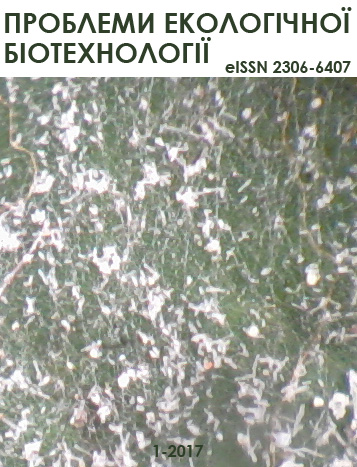The chemical composition influence of oil products on the efficiency of carbon-oxidizing microorganisms cultivation
DOI:
https://doi.org/10.18372/2306-6407.1.11646Keywords:
oil products pollution, biodegradation, microorganismsAbstract
An investigation was made of the ability to grow microorganisms in conditions of water pollution with oil products. The study of the destructive activity of carbon-oxidizing microorganisms Penicillium crysogenиm, Pseudomonas syringae, and Bacillus subtilis has shown that they are capable to grow in oil contamination conditions, namely synthetic motor oil of grade ZIC XQ 5W-30 and mineral motor oil of grade MD 15W-40. The most active destructor of oil products in this experiment is Bacillus subtilis microorganisms, whose biomass gain on mineral motor oil is 55,4%. A different sensitivity of oil destructor microorganisms to the chemical composition of oil products is set, which is determined by the natural characteristics of the strains.References
Воробьева Т. Г. Биосорбция – aльтернативный метод очистки промышленных сточных вод / Т. Г. Воробьева, И. Ю. Шлёкова // Культура и образование как фактор развития региона: матер. междунар. науч.-практ. конф. – 2008. – С. 63–68.
Rapid intrinsic biodegradation of benzene, toluene, and xylenes at the boundary of a gasoline-contaminated plume under natural attenuation / Y. Takahata, Y. Kasai, T. Hoaki, K. Watanabe // Appl. Microbiol. Biotechnol. – 2006. – Vol. 73, № 3. – P. 713–722.
Naphthalene degradation and incorporation of naphthalene-derived carbon into biomass by the thermophile Bacillus thermoleovorans / E. Annweiler, Н. Н. Richnow, G. Antranikian, S. Hebenbrock, C. Garms, S. Franke, W. Francke, W. Michaelis. // Appl. Environ. Microbiol. – 2000. – Vol. 66. – P. 518 – 523.
Comparison of methods to detect biosurfactant production by diverse microorganisms / N. H. Youssef, K. E. Duncan, D. P. Nagle, K. N. Savage, R. M. Knapp, M. J. McInerney. // Journal of Microbiological Methods. – 2004. – Vol. 56., № 3 – P. 339 – 347.
Таранова Л. В. Влияние бактерий и дрожжей на биохимическое окисление нефти / Л. В. Таранова, Е. Б. Жданова. // Нефть и газ Западной Сибири: тез. докл. междунар. научн.-техн. конф., Тюмень. – 1996. – T. 2. – С.126.
Cooper D. G. Surface-active agents from two Bacillus species. / D. G. Cooper, B. G. Goldenberg // Appl. Environ. Microbiol. – 1987. –V. 53. –P.224–229.
Connors M. A. Naphthalene plasmid in Pseudomonas. / M. A. Connors, E. A. Barnsley. // J. Bacteriol. – 1982. – V. 149. – P. 1096.
Dockyu K. Monocyclic aromatic hydrocarbon degradation by Rhodococcus sp. strain DK1. / K. Dockyu, K. Young-Soo, K. Seong-K. // Appl. Environ. Microbiol. – 2002. – №. 7. – P. 3270–3278.
Actions of a versatile fluorene-degrading bacterial isolate on polycyclic aromatic compounds. / M. Grifoll, S. A. Selifonov, C. V. Gatlin, P. J. Chapman. // Appl. and Environ. Microbiol. – 1995.– V. 61. – P. 3711–3723.
Сваровская Л. И. Нефтеокисляющая активность микрофлоры при биодеструкции вязкой нефти месторождения Зуунбаян / Л. И. Сваровская, Л. К. Алтунина. // Добыча, подготовка, транспорт нефти и газа. – Томск: ИОА СО РАН, 2007. – С. 231–235.
ДСТУ 4247:20003. Нафтопродукти. Метод визначення біорозщеплюваності. – К.: Держспоживстандарт України, 2004. – 14 с.
Суржко Л. Ф. Очистка природных и сточных вод от нефтезагрязнений иммобилизованными углеводородокисляющими микроорганизмами: дис. к. т. н.: 03.00.23. – Санкт-Петербургский технологический институт– Санкт-Петербург, 1999. – 117 с.
Ветрова А. А. Биодеструкция нефти отдельными штаммами и принципы составления микробных консорциумов для очистки окружающей среды от углеводородов нефти. / А. А. Ветрова, А. А. Иванова, А. Е. Филонова. // Известия ТулГУ. Естеств. науки. – 2013. – № 2–1. – С. 241–257.
Osuji L. C. Environmental degradation of polluting aromatic and aliphatic hydrocarbons: a case study. / L. C. Osuji, A. Ozioma. // Chem. Biodivers. – 2007. – Vol. 4. – P. 424–430.
Prince R. C. The primary aerobic biodegradation of gasoline hydrocarbons. / R. C. Prince, T. F. Parkerton, C. Lee. // Environ. Sci. Technol. – 2007. – Vol. 41., № 9. – P. 3316–3321.
Frazer A. C. Toluene metabolism under anaerobic conditions: a review. / A. C. Frazer, P. W. Coschigano, L. Y. Young. // Anaerobe. – 1995. – Vol. 1. – P. 293–303.
Musat F. Anaerobic degradation of benzene by a marine sulfate-reducing enrichment culture, and cell hybridization of the dominant phylotype. / F. Musat, F. Widdel. // Environ. Microbiol. – 2008. – Vol. 10. –№ 1. – P. 10–19.
Хоменко Л. А. Нокардіоподібні актинобактерії – деструктори моторних олив: дис. к. т. н.: 03.00.07. – НАНУ, Ін-т мікробіології і вірусології ім. Д. К. Заболотного. – К., 2007. – 154 с.


